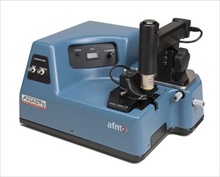Channels
Special Offers & Promotions
New AFM platform from Anasys for analytical measurements
 Anasys
Instruments, the company that pioneered nanoscale thermal analysis and
nanoscale IR spectroscopy using an AFM, has chosen the Fall 2011 MRS meeting to
introduce a brand new, easy-to-use research and analysis tool. The afm+ is the
first fully integrated AFM platform to offer three important analytical
capabilities.
Anasys
Instruments, the company that pioneered nanoscale thermal analysis and
nanoscale IR spectroscopy using an AFM, has chosen the Fall 2011 MRS meeting to
introduce a brand new, easy-to-use research and analysis tool. The afm+ is the
first fully integrated AFM platform to offer three important analytical
capabilities. Using Anasys' proprietary thermal probe technology for Nanoscale Thermal Analysis (nano-TA), the afm+ allows the user to obtain transition temperatures on any local feature of a sample or to obtain a transition temperature map. It makes measurement of glass transition temperatures (Tg) and melting temperatures (Tm) a simple operation. This mode also includes Scanning Thermal Microscopy (SThM) which allows the user to map relative thermal conductivity and relative temperature differences across the sample.
Transition temperature microscopy (TTMTM) is used to quantify and map thermal transitions in heterogeneous materials. Transition temperature microscopy (TTM) is a fully automated mode in which an array of nano-TA measurements is rapidly performed and each temperature ramp is automatically analyzed to determine the transition temperature.
Finally, the afm+ is fully upgradeable to perform nanoscale infrared spectroscopy for measuring and mapping chemical composition on the nanoscale. This technology enables point-and-click nanoscale IR spectroscopy that produces IR spectra that correlate to FTIR libraries. This makes chemical imaging on the nanoscale a reality. The upgrade options also include the ability to measure the mechanical properties of samples. Data may be collected using a contact resonance method to map stiffness variations simultaneously with the topography.
In summary, the afm+ is providing the basis for a multifunctional nanoscale measurement suite. The afm+ is fully upgradeable to the Anasys nanoIR system, a probe-based measurement tool that utilizes infrared spectroscopy to reveal chemical composition at the nanoscale. The nanoIR also provides high-resolution characterization of local topographic, mechanical, and thermal properties. Potential application areas span the realms of polymer science, materials science, and life science, including detailed studies of structure-property correlations.
For further details, please visit www.anasysinstruments.com
Media Partners


